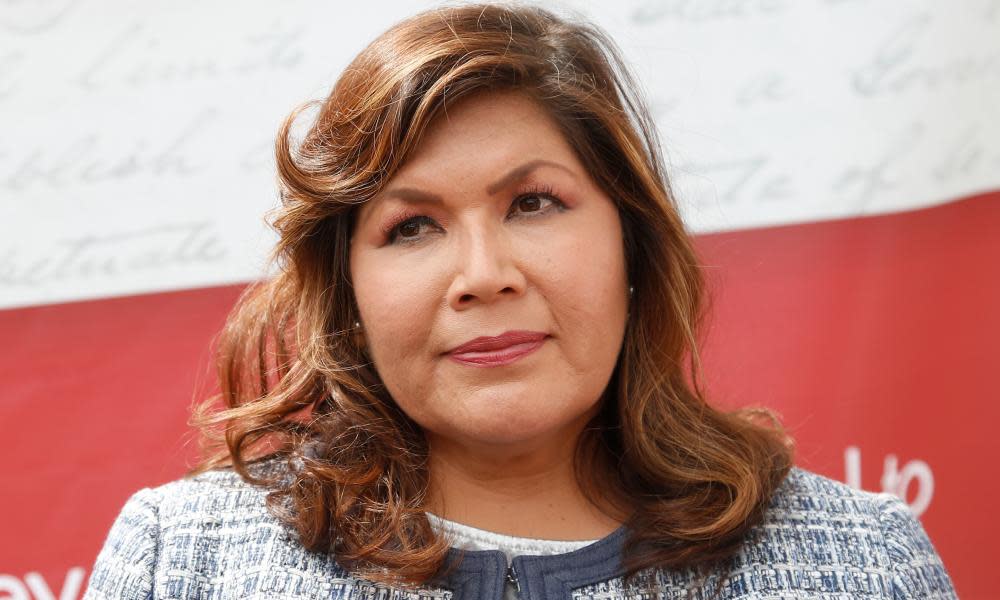Will Congress finally fulfill a 200-year-old promise to the Cherokee people?

The 1835 Treaty of New Echota precipitated tens of thousands of Cherokee joining the infamous Trail of Tears – giving up their ancestral homes in the south-east, to trek to what is now Oklahoma.
In a minor concession to the Cherokee people, buried within the treaty was a promise that the nation could appoint a delegate to the House of Representatives, to have at least some sort of say in the government that had forced them for their land.
Over the next two centuries, as the Cherokee struggled to establish themselves in Oklahoma, sought to overcome the trauma of being forced from their land, and the country went through a brutal civil war, the notion of sending a Cherokee representative to Washington DC was largely forgotten.
Until now. This month the principal chief of the Cherokee nation, Chuck Hoskin, appointed Kimberly Teehee as delegate to Congress – taking the federal government up on its nearly 200-year-old offer.
“I feel we are in an environment now where Congress is more educated about Native American issues,” Teehee said.
“We have four members of Congress, people who are citizens of federally recognised tribes, who take on our issues and champion our issues. There is a bipartisan Congressional Native American caucus, whose job is to educate, on a bipartisan basis, members of Congress about Native American issues.”
The Cherokee Nation has never sent a delegate to Congress before. While they are hopeful the House will honor the terms of the New Echota treaty, there will be a wait before – hopefully – Teehee can take up her post.
If she does, she will be able to advocate for the nearly 380,000 citizens of the Cherokee Nation, which spans almost 7,000 square miles in Oklahoma. The nation has its own elected government, but is reliant on the federal government financially. In 2019, Hoskin said, the Cherokee nation is thriving compared with previous decades. That influenced the decision to push for further representation.
“The Cherokee Nation is in a position of relative strength, both political strength and economic strength, with the wellbeing of our citizens on the rise,” Hoskin said.
“I think now is the time to assert this treaty provision, so that we can do more than what we’ve done in recent decades. We’re sort of standing outside of the Congress and advocating for our needs and for the government of the United States to live up to its obligations. [Now we could be] be inside Congress, and do what our ancestors contemplated when they negotiated those terms.”
While the Cherokee Nation is self-governing, running and managing its own schools, hospitals and infrastructure programs, it relies on grants from the government. That funding comes from the “discretionary funding” portion of the budget. But the amount of discretionary funding can wax and wane depending on negotiations between Congress and the president, or the state of the economy.
“So, depending on the political dynamics, you know, there may be a contraction in any given year of the discretionary spending in this country,” Hoskin said.
Changing that will be one of the key aims for the Nation, and Teehee. Currently a main path to introducing legislation is through approaching sympathetic members of Congress. With a delegate, the Cherokee Nation would be able to bring in their own bills, which could potentially lead to a vote in Congress.
Professor Lindsay Robertson, Chickasaw Nation endowed chair in Native American law at the University of Oklahoma, said the impact of having a delegate in the House should not be underestimated.
“It could be enormously beneficial,” Robertson said.
“[The delegate] would be entitled to membership in committees. They could vote in committees, they could introduce legislation and they could speak on the floor of the House of Representatives.
“On top of that, there’s the benefit that comes from simply being in the room. The Cherokees having a delegate – who could well opt to serve as a representative for Indian country, for Native rights in general – in the halls of Congress all the time could be enormously beneficial to all tribes, not just the Cherokees.”
Hoskin said that “even though the Cherokee Nation congressional delegate is first and foremost and advocate for the Cherokee Nation”, he expects that being afforded a delegate to Congress is something that can help Native Americans across the US. He says his efforts have been applauded by other tribes.
“In 2019, I think tribal leaders recognize the benefit of solidarity: that we get more done together than we do separately,” Hoskin said.
“And so I have been very careful to tell tribal leaders and to express in interviews that my expectation is that Kim Teehee will be somebody with an open door to leaders across Indian country.
“And no doubt some of the issues that she’ll work on will be issues that are of concern not just to the Cherokee Nation but across tribal governments in this country.”
The question now is whether politicians in Washington decide to let Teehee take up her post. The House could decide on its own that it is able to appoint a Cherokee delegate, but members could also deem that the Senate, and perhaps even the president also need to agree.
Teehee is optimistic she will be appointed, but knows that process will take time. In the meantime, she said she will push Congress to grant the Cherokee Nation the right that was promised in 1835.
“I want to take one step at a time, I don’t want to get ahead of ourselves. But I also want the discussion and the analysis and the process to keep moving. I hope that there’s no stall and that we’re all continuing to be motivated about this,” Teehee said.
“We’ve nearly 200 years, and we can wait a little longer. But I do want it done.”

